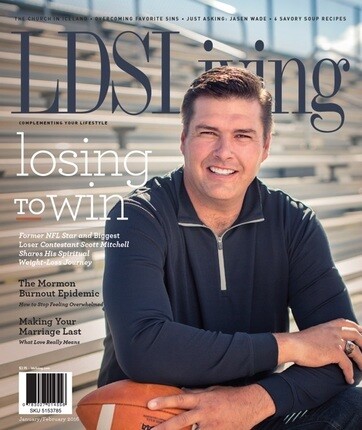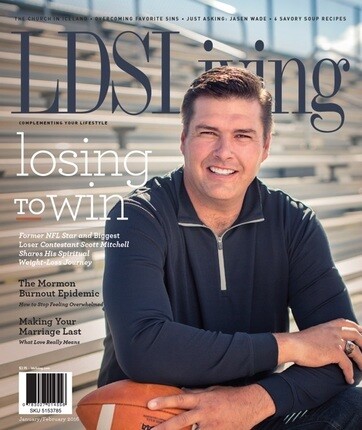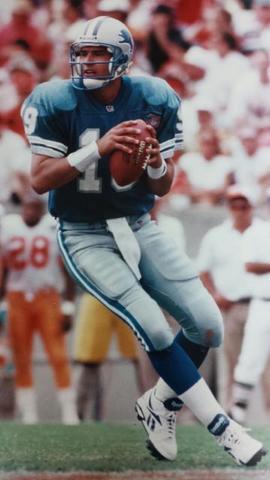When former NFL star Scott Mitchell became a contestant on The Biggest Loser, NBC’s weight-loss competition, he didn’t realize he was playing perhaps the most important game of his life. While losing more than 120 pounds on reality TV transformed him physically, the experience also transformed him spiritually in ways he couldn’t have imagined.
In the summer of 2014, Scott Mitchell stood in the center of the Los Angeles Memorial Coliseum. The former NFL quarterback had been on similar playing fields countless times during his 12-year professional football career. But this time, he was not throwing a winning pass in front of throngs of cheering fans. This time, he was being weighed on The Biggest Loser reality TV show in front of millions of viewers. Wearing nothing but a pair of shorts, the exposed and vulnerable Mitchell anxiously watched as the scale beeped and flashed until finally settling on a number. The six-foot six-inch former star athlete weighed 366 pounds.
“I was in complete shock,” he says. “I’d never weighed that much in my life.”
But the shock didn’t end there. Mitchell was also told that he was one of the unhealthiest contestants they’d ever had on the show.
“It was a blow to my ego to go from being a world-class athlete to being the biggest of The Biggest Loser contestants in terms of health,” he recalls.
So what happened?
Glory Days
Growing up in the small town of Springville, Utah, Mitchell was a gifted athlete from a very young age. He was a high school football, basketball, and baseball star. He enjoyed a record-setting career as a quarterback for the University of Utah. And he defied the odds and made his childhood dreams come true when he was drafted into the NFL by the Miami Dolphins in 1990.
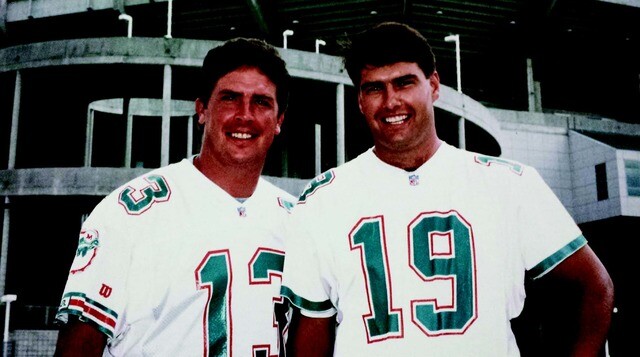
Dan Marino and Scott Mitchell. Photo courtesy of Scott Mitchell.
“I went to a team with one of the greatest quarterbacks ever, who was still in his prime—Dan Marino,” he recalls.
Mitchell served as Marino’s backup for a few years, but when Marino was injured in the 1993 season, Mitchell got his chance to shine, leading the Dolphins to several victories.
After the season ended, Mitchell became a free agent. The Dolphins wanted to re-sign him, and the St. Louis Rams, New Orleans Saints, and Minnesota Vikings all expressed serious interest. But Mitchell ultimately chose to sign a three-year, $11.5 million contract with the Detroit Lions, with a $5 million signing bonus up front. While with the Lions, he set single-season records for touchdown passes and passing yards.
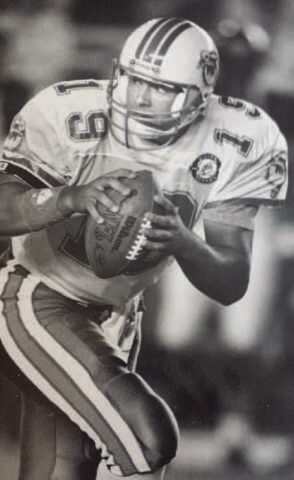
Photo courtesy of Scott Mitchell
Mitchell was traded to the Baltimore Ravens in 1999 before signing with the Cincinnati Bengals in 2000, where he stayed until the end of his professional career in 2002. Those 12 years were an emotional roller coaster for Mitchell. He suffered injuries, personal disappointments, thrilling victories, and everything in between. As his fame grew, he endured intense scrutiny by coaches, fans, and the media. As a result, Mitchell had anything but a healthy relationship with food.
“I struggled with food my whole NFL career,” he shares.
“During the season, you had weigh-in day and an assigned weight—some number they felt you should be, although there was never any evaluation or testing to see what your ideal weight actually was. If you were over your assigned weight, you got fined a dollar amount per pound. I once lost 15 pounds in one day. It was brutally hard and very stupid.”
When the off-season came, Mitchell relaxed and enjoyed himself, gaining as much as 20 pounds.
“I would often rationalize, ‘What’s a few pounds? I’ll just work it off at the last minute,’” he says. “This was a dangerous mindset that would become one of my biggest downfalls.”
A Lifelong Battle
But Mitchell’s issues with food didn’t begin in the NFL. In fact, they started in early childhood.
“My mother was an amazing cook, but none of what she cooked was healthy,” says Mitchell.
He continues, “My parents grew up in an era of ‘everything’s okay’—you don’t talk about problems. I didn’t learn until years later that my mom was struggling with her relationship with my dad, which left her emotionally unavailable. I craved more of a connection with her, and our only real connection as a family revolved around food.”
Though Mitchell’s active sports lifestyle helped him maintain a healthy weight during his young adult years, after his professional football career ended, his weight began to climb.
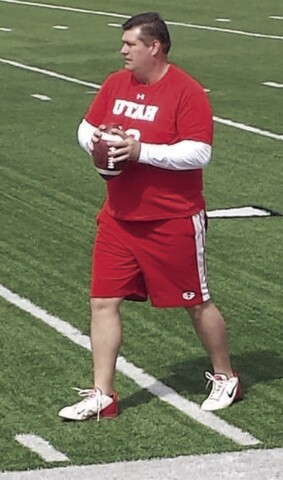
Photo courtesy of Scott Mitchell
By 2008, when he returned to Springville to coach the high school football team, Mitchell’s weight had reached 300 pounds. And when he stepped back from coaching to focus on his software business in 2012, the stressful and sedentary lifestyle took an even bigger toll on his health, causing him to gain even more weight.
“Without knowing it, I had thrown in the towel of my life and was essentially just going through the motions each day,” he admits. “I had resigned myself, like so many overweight people do, to the fact that I was always going to be fat. I just got tired of fighting it, so why bother?”
A Grim Future
In January of 2014, Mitchell’s father passed away from obesity-related causes. For the last six years of his life, the 450-pound man suffered from diabetes, cellulitis, neuropathy, and several life-threatening infections, including gangrene, which led to the amputation of his leg.
“I felt like I was supposed to see all of it,” Mitchell says. “I was supposed to feel it and internalize the gruesomeness of it.”
Mitchell spent the last precious moments with his father in a hospital room. That’s when he noticed some butterfly stickers on the door, and he had an epiphany.
“I realized my dad was like an old worn-out caterpillar, but after the Resurrection, he would be a magnificent and beautiful butterfly,” he says. “It was so powerful and so beautiful—I found a lot of peace when my dad was dying.”
But Mitchell knew he would experience the same grim fate as his father if he didn’t get his weight under control. “I realized that would be my own future if I didn’t change,” he says.
Divine Intervention
A few months after his father’s death, while Mitchell was hesitantly preparing to play in the University of Utah alumni flag football game, he went online to check the local traffic and weather. While on ksl.com, something caught his attention: several events in the Salt Lake City area would contribute to heavy traffic that day, including auditions for The Biggest Loser: Glory Days. When he discovered that the show was looking for former athletes to compete as contestants, he felt prompted to fill out an application for the reality series. But when it was time for auditions, Mitchell decided not to show up.
“I just couldn’t go in,” he recalls. “I’d been in the public eye as a professional football player for 12 years, and I didn’t want the criticism that I would get for letting myself get so big and out of shape. I felt so guarded and defeated in life. I thought, ‘There’s no way I’m going to be on this show and expose myself to vulnerability.’ I just didn’t think I was emotionally up to it, so I left.”
Despite being a no-show at the auditions, a casting director contacted Mitchell a few weeks later and asked if he was interested in competing.
“I can’t thank him enough for making that call,” he says. “The Biggest Loser: Glory Days was a second chance at getting my life back. I decided I didn’t care anymore what people thought—my life was more important than any criticism I might get from people.”
So the father of five said yes.
The Physical Transformation
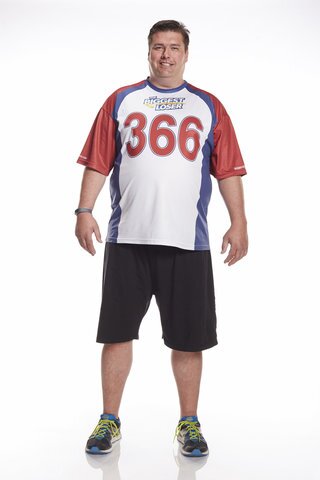
Photo courtesy of NBC/Trae Patton
Mitchell traveled to Los Angeles, where he would spend the next four and a half months competing on The Biggest Loser Ranch.
“The first day on the show, we were walking from the bus to the gym, and we were all huffing and puffing just to get there,” he recalls.
Mitchell’s diet changed dramatically once on the show, and with the help of a nutritionist, he learned that healthy food could taste good. He experimented with healthy recipes, and instead of overeating, he spent his days swimming, hiking, and using the spin bike.
Each week, the contestants competed in various challenges and participated in a weigh-in, with someone being eliminated at the end of each episode. After fiercely competing for 16 weeks and losing a jaw-dropping 126 pounds, Mitchell was eliminated from the
competition in the last episode before the finale. Though Mitchell wanted to compete to the end, he accomplished his ultimate goal—he reclaimed his life and his self-worth.
“I left it all on the table and gave it everything I had,” he says. “I’m very proud of my accomplishments.”
Mitchell’s time on The Biggest Loser: Glory Days was about much more than just weight loss, however. He says the competition was just as much a spiritual journey as a physical one.
The Spiritual Journey
What was the key to Mitchell’s weight-loss success? Small daily sacrifices—physically and spiritually.
“Just like the gospel, everything was line upon line, little by little,” he explains. “When you go to the gym and exercise, you aren’t going to lose 100 pounds the first day. Growth happens over time. Transformation happens by doing little things every day.”
“The first day I was on the show, they said I would lose weight, but if I didn’t get to the bottom of why I gained weight, it would all come back,” he recalls. “So, I spent a lot of time soul-searching, praying, and crying. I deepened my relationship with God and my testimony of Christ. I found who I am and what I’m fighting for.”
Much of Mitchell’s soul-searching took place on his daily hikes. A few weeks into the competition, his trainer, Dolvett Quince, pulled him aside and asked him what he thought about while on these hikes.
Mitchell recalls, “We sat down for the conversation, and Dolvett’s legs were stretched out in front of him. He asked, ‘Scott, how are you doing?’ Just then, a butterfly landed on his shoe, and I started to cry. I knew it was a message from my dad, just letting me know that I was going to be okay and that I didn’t have to wait until I died to make a transformation.”
This was only one of many times Mitchell would encounter butterflies on the ranch—always in moments when he needed them most. It was especially meaningful to him when, during Week 11, each contestant was given a butterfly to release as a symbol of their commitment to weight loss. “It was very emotional,” he says.
During the competition, Mitchell found deeper symbolism and spiritual meaning not only in butterflies but also in many of his experiences.
“Most days I would hike up and watch the sunrise, which is an amazing sight in itself, but as I started each day hiking, there would be fog covering the mountains, and as the sun rose, it eventually would melt the fog and expose the beautiful mountains. It hit me that my body was like the mountains, and my beauty was hiding behind my own fog, which was fat. With the assistance of an external source, the sun, or God, I have been able to remove that fog to expose the beauty that lay hidden and allow my true potential to come out.”
He continues, “We all need the Atonement in our lives and to humble ourselves—to allow the Son to penetrate the fog in our lives.”
As Mitchell contemplated his life, he began to recognize how food tied into his childhood and relationships with his parents. He also learned to view failures in a completely different way.
“Growing up, I thought I always had to be perfect,” he shares. “But there’s a part of learning from your failures that has a greater impact than having success all the time. I’ve learned how to have patience and endurance and to love myself. Making mistakes is part of learning and growing.”
He adds, “During this process, I had to humble myself and ask for help and be willing to do the work and have faith that I could be helped. Opening up my emotions and admitting I had a problem that I couldn’t fix myself actually saved my life.”
Continuing the Journey
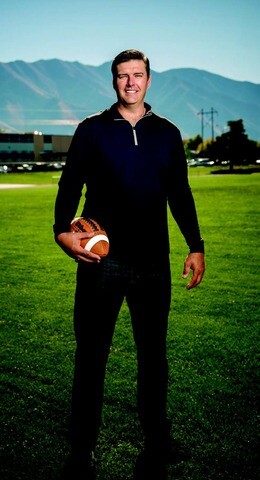
Photo by Jed Wells
In addition to reclaiming his life, Mitchell used his time on The Biggest Loser: Glory Days to be an example to his family.
“My wife, Wendy, and my kids didn’t want me to go on the show,” he recalls. “They told me, ‘You don’t have time for this. You’ll be gone too long.’ But then they saw how much of an impact the show had on me, and I was able to let them watch while I worked on something that I struggled with.”
He continues, “They learned that it’s okay to struggle, and it’s okay to get help. I wanted my kids to see that we all have problems, and everything isn’t always okay. You can ask questions, and you can seek help. We are all beggars before God, and we all need the assistance of something or someone at some point in our lives.”
Mitchell says his children also learned that making short-term sacrifices can pay off in the long run. “My family gave me up for four and a half months in order to have me around for years to come,” he explains.
Because of all the sacrifices and the success Mitchell achieved, he had a plan in place to ensure that he didn’t revert to old habits after leaving the show and returning to normal life.
“I surrounded myself with the right people, and I had to recognize that some relationships didn’t work—not necessarily a person, but even certain restaurants. I had to establish boundaries and align myself with friends who could support me in my goals,” he says.
Another key to his continued success was planning for various circumstances. “Just like in the gospel, we need to make our choices before we are put in the situation,” he says. “If you are going to a restaurant or a party, know beforehand what you are going to eat. Learn to understand your environment and how it impacts your success.”
Mitchell says he also had to learn to do things he didn’t really like but that were good for him, like exercising and cooking healthy food. “Sweat and muscle soreness aren’t fun, but I exercise because it benefits me. And now I actually like cooking healthy food and know how to make it taste good. That has been so empowering.”
He adds, “It’s not about getting to a goal weight and that’s it—it’s about being physically, emotionally, and spiritually present every day.”
Mitchell’s experience on The Biggest Loser: Glory Days can only be described as life-changing, but he is the first to acknowledge that he still struggles and that he isn’t perfect.
“I still have hard days,” he shares. “But I have a better perspective, and I have a game plan with all the tools I need to deal with what life throws at me. My journey is just beginning.”
Scott Mitchell shares many more insights and personal experiences in his autobiography, Alive Again. To learn more about his book or to contact him directly, visit scottmitchell19.com.
Find this and other inspiring stories in the January/February 2016 issue of LDS Living magazine.

